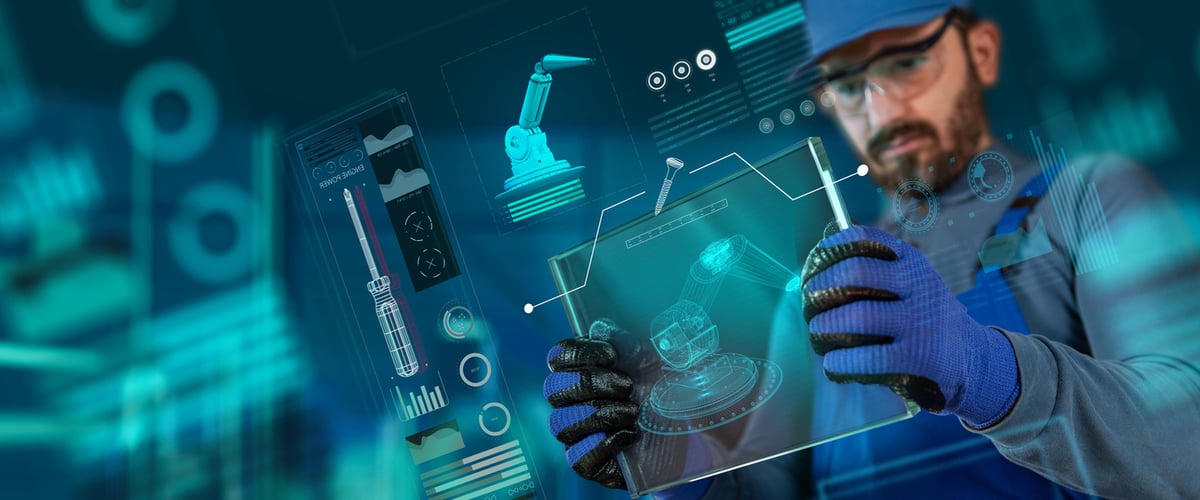
Intelligent Robots Are Transforming Industry Across the World
Comau is a Business Reporter client.
In recent decades, robots have become increasingly central to the evolution of a range of industries and industrial processes, especially manufacturing. Advanced robotics are now found in factories all over the world, driving faster and more accurate production of goods.
Now, robots are starting to move out of the factory—for example, for solar panel installation, where robots can help increase productivity, and for maintenance of wind turbine blades. Robots are integral to what is commonly referred to as the Fourth Industrial Revolution, or Industry 4.0., where humans are at the center of the production process and efficiently and safely collaborate with robots and other industrial machines.
But just as any revolution marks the start of a new era, the robots that brought us to this point are only the start of a new phase in the development of intelligent technology. They have already had a transformative impact on numerous industries, but as demands for more intelligent industrial processes grow, robots are undergoing their own evolution.
The thinkers of tomorrow
Robots have traditionally been “doers”: They perform tasks set by humans, according to strict directions given to them. Their go-to function is repetition. What they need to develop is the capacity to make certain decisions independently of their human overseers. In short, robots will need to become “thinkers,” and interpret dynamic data and respond accordingly. By doing so, they will be better able to work alongside human operators in a symbiotic relationship in which both focus on complementary, value-added activities.
This is necessary for several reasons. Market conditions have evolved as industrial processes have grown more sophisticated, and this has changed the nature of competition. In manufacturing, competition over time-to-market for goods has increased dramatically as new technologies have been introduced to the factory floor. This has increased the need to manage and minimize unpredictability in manufacturing processes; reduce or eliminate any delays and supply shortages; and perform functions at higher speeds and with greater accuracy.
Introducing to an operation a robot that can “think” as well as do—a robot equipped with intelligent automation functions—satisfies the dual need for efficiency and reliability. It enables better resource use and increased productivity while simultaneously minimizing the likelihood of error, improving quality as a result.
Transforming industry, robot by robot
Comau has been a global leader in the field of industrial automation for close to half a century. With a commitment to continuous innovation and research, it offers its customers expertise, the newest technologies and advanced training in the most progressive sectors, including digital transformation and electrification.
The company, headquartered in Turin, Italy, understood early on that manufacturing would be transformed if robots became more than just doers, and it set about developing advanced Industry 4.0-enabled robots that draw on the latest developments in AI and IoT to enhance their performance.
AI streamlines deployment and greatly reduces the cost of programming and testing, while IoT features put the robot in communication with everything in its environment and predict where maintenance is needed in advance of bottlenecks or equipment breakdown. Lasers coupled with AI vision systems also can detect potential problems up ahead and reduce downtime.
The innovations that AI and IoT have introduced are transformative, and their applications are far-reaching. Robots and technologies provided by Comau—one of only a small handful of companies with such a wide-ranging offering—are present in every industry across the globe.
Its robots meet two pressing needs of modern industry: variability and customization. These features are central to the “thinking” robot. Rather than stopping when they encounter an error—say, an engine part in the wrong place on a factory line—intelligent robots are equipped to look for errors or imperfections and respond immediately, thereby allowing them to continue their task without delay. Just as they can use the powers of IoT to sense what is around them and predict the actions of nearby machines, those nearby machines are able to sense the robots. The whole smart factory environment is in a state of symbiosis, and this has a profound effect on efficiency and safety.
Comau has ensured that access to these robots, together with a variety of other cutting-edge technologies, is more democratic than it has been historically. The company has aimed to serve not just giants of industry, but also small and medium-sized manufacturers, regardless of what they produce. Its solutions—hardware, software, vision systems, AGVs and more—are all developed in-house and are designed to respond to the unique needs of each customer, and Comau works side by side with the customer throughout the process of acquiring, installing and testing its robots.
Freedom to think
The transition from industrial to intelligent robotics is already transforming industrial processes and is set to do so well into the future. A sense of freedom and autonomy is designed into today’s robots, which now have a level of intelligence that enables them to make their own decisions, free of human interference. This frees up human labor to focus on the jobs robots cannot do.
Comau sees endless enhancement of robots’ capabilities in the future. They will be faster and lighter; they will be completely mobile and able to go everywhere; they will play a central role in sustainability; and they will work better alongside people. In short, their impact on industry, as well as work-life quality, will be game-changing.
For more information, please visit comau.com.
